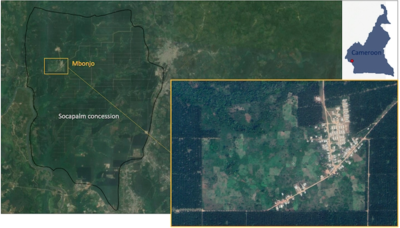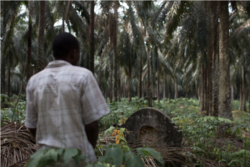Mongabay | 4 May 2023
Palm oil giant hands over sacred community land for reforestation project
by Yannick Kenné
MBONJO, Cameroon — Felled palm trees litter the ground at the entrance to Mbonjo, a town at the heart of Cameroun’s palm oil and rubber-producing region. Mbonjo hosts palm groves totaling an area almost ten times the size of Manhattan, New York City, clocking in at more than 58,000 hectares (143,300 acres). Operated by Socapalm, a local subsidiary of the French-Belgian agribusiness giant Socfin, the company has a long history of controversy in the region with local critics accusing it of land grabbing and human rights abuses.
There, in the area cleared by felling trees and setting up barricades, lies ancestral community graves.
These relics in this Mbonjo palm tree grove, also in a high conservation value area, are on land now handed over to local communities after more than two years of negotiations by the NGO National Cameroon Water Communities (SYNAPARCAM) and traditional chiefdoms in Mbonjo and Souza with Socapalm.
The campaign to recuperate some local lands, joined SYNAPARCAM, traditional chiefs and Socapalm together to identify five sites in the area to be designated as sacred to protect the area’s ancestral tombs, historic nature, or certain medicinal plants growing there, from the company’s plantation.
However, the community’s campaigns, while supported by civil society organizations, have only made the company hand over three of five sites, a total area of approximately three hectares (about seven acres), while they initially aimed for 30 hectares (74 acres).
Socapalm’s activities in the region regularly come under scrutiny by environmental organizations, who question the plantations’ certification by the Roundtable on Sustainable Palm Oil (RSPO), a multi-stakeholder body that promotes sustainable palm oil production. SYNAPARCAM also accuses Socapalm of exploiting sacred sites, land grabbing from sustenance farmers, abusive occupation of people’s homes, dumping wastewater and polluting rivers, their security agents frequently threatening local communities, as well as sexual violence on their plantations.
“According to RSPO principles, high conservation value areas should be respected. Our sites have been sacred since Socapalm-State [before the company was a Socfin subsidiary and run by the Cameroonian state],” explains Emmanuel Elong, president of SYNAPARCAM. “But in 2020, we finally contacted Socapalm. As Africans and people with respect for tradition, we informed them that we have sites in their plantations where we perform our rituals and buried our dead, and that their security service was blocking off access.”
Socapalm told Mongabay that it is committed “to guaranteeing access and usage rights for the sacred sites to the communities involved,” specifying that this is in no way a ceding of these lands to the communities, which are owned by the Cameroonian State, which Socfin operates on under a long-term lease.

Restoration and reforestation of sacred sites
In Cameroon, agriculture giants producing palm oil are major drivers of deforestation.
Palm oil plantations have razed thousands of hectares of forest, causing large biodiversity loss. One such example is the company Cameroun Vert (CAMVERT), which has felled 60,000 hectares (148,000 acres) of forest in Campo and Niete in southern Cameroon for national palm oil production, to try to help bridge the country’s palm oil deficit which is currently estimated at 150,000 tons. According to WWF, agriculture industries in Cameroon’s palm oil sector occupy nearly 120,000 hectares (almost 297,000 acres) of land across the country.
In January 2021, SYNAPARCAM and traditional local leaders submitted a recovery plan for their sacred sites to Socapalm to try to win its support. An important part of this plan: reforestation and afforestation on sacred sites and lands.
More specifically, Emmanuel Elong remarks that among the lands not yet handed over, they plan to develop 15 hectares (37 acres) of forest, “similar to the sacred forests in the western part of the country where we will institutionalize a traditional festival for Mbonjo and Souza communities, just like the Ngondo festival [a traditional and ritual festival of Cameroonian coastal peoples].”
The plan also listed several other points, namely: developing sustainable site management tools; reducing the vulnerability of local communities; empowering dignitaries and stewards of sacred forests by promoting ancestral cultures and legally recognizing sites.
In the Souza-Bonassama district, the traditional chief Daniel Sappa regrets that the site identified in his village has still not been handed over to them.
“We want to turn it into a medicinal garden where we can also do some traditional artwork and revive our culture,” he says.
Contested plantation certification
Despite allegations against Socapalm and breaches discovered to sustainability guidelines and encroachment on community land by an auditing team mandated by the RSPO, Socapalm retains or received renewed certifications for six of its plantations in Dibombari, Mbambou, Eséka, Edéa, Kienké, including Mbonjo. Kienké was certified this past January.
Following the verification audit, RSPO wrote to Socapalm in July asking the company to revise its free, prior, informed consent (FPIC) policy and implementation, and to identify Iandownership through social and environmental impact assessments.
SYNAPARCAM and several national and international environmental organizations criticized the Socfin group’s renewal of certifications and say they should be revoked under the conditions found.
Obtaining the five-year certification means RSPO will evaluate if the company is implementing its recommendations and complying with environmental and company obligations.
Emmanuel Elong, further doubts the independence and credibility of the auditing team from American firm SCS Global Services, and remains frustrated by the renewal of the Mbonjo plantation.
“RSPO needs to talk to the Socapalm workers directly, to find out if they are well treated, well paid, and if the company is listening to our concerns. Instead, Socapalm went to select staff who are on their side, gathered them together, and directed the RSPO auditor to them.”
Socapalm denies these allegations, saying that “the audit schedule is established before the visit exclusively by the auditors, and the consultations are open and public.”













